The commander of the Armed Forces of Ukraine Naev warned about preparations for the expansion of the conflict with Russia
The commander of the Armed Forces of Ukraine, Sergei Naev, in an interview with ABC News, said that the conflict with Russia could go beyond the eastern and southern parts of Ukraine. According to him, this could happen if Moscow continues to increase the production of weapons and "technologically improve with the help of its allies." The general stressed that the reduction of aid from Western partners "will really hit the defense capability" of Ukraine, but will not stop it. For more information, see the material "Newspapers.Ru".
Military operations may extend beyond the eastern and southern parts of Ukraine if Russia continues to increase the production of weapons and improve technology. This opinion was expressed by the commander of the joint Forces of the Armed Forces of Ukraine, Lieutenant General Sergei Naev, in an interview with ABC News.
ABC News journalists emphasize that the Ukrainian counteroffensive in the south over the past five months has brought little results, despite the fact that at the beginning of the conflict Ukraine achieved success in Kharkiv and Kherson. The authors of the article believe that Russia adapts and develops its tactics, uses modern weapons and relies on its air superiority. This affects the course of hostilities.
"The crucial importance of technology"
Naev notes that with the onset of winter, the main threat to Ukraine is air attacks. ABC News writes that one of the largest training centers for mobile air defense units (air defense) is located in a secret location in the north of Ukraine.
According to the Lieutenant General, they use any assistance that the APU receives to create mobile firing groups "to fill every inch of space." Military personnel are learning to hit small drones with different types of anti-aircraft guns. The soldiers showed journalists one of the trainings. It took them about five minutes to get into the drone, but it could still maneuver in the sky.
According to the publication, in such a scenario in real life, military personnel will have to use modern Western air defense systems to destroy drones, that is, launch missiles that cost 100 times more than a drone.
Naev said that now there is a "war for resources." He also claims that Russia receives military assistance from North Korea and Iran (Moscow has repeatedly denied such statements).
According to ABC News journalists, over the past two months, Russia has launched more than 800 UAVs towards Ukraine. "And no matter how hard Ukraine tries to prepare by training hundreds of mobile air defense groups, it's no longer a matter of numbers in this conflict," the authors of the article write.
According to Naev, "technology is crucial." He noted that Western weapons allow you to spend less shells to shoot down a target. For this reason, the help of the West is so important to Ukraine.
Aid is being cut
Due to the aggravation of the situation in the Middle East and political differences between Republicans and Democrats, one of Ukraine's main allies, Washington, is now providing less military and humanitarian assistance to the country. The European Union also cannot fulfill its promises: the EU wanted to transfer 1 million artillery shells to Ukraine, but could not because of production problems and rising prices for ammunition.
Moreover, not all EU leaders agree to support Kiev. Thus, Hungarian Prime Minister Viktor Orban has repeatedly spoken out against the allocation of an additional aid package to Ukraine and against the introduction of new sanctions against the Russian Federation. He also threatens to block the decision on Ukraine's admission to the EU.
Poland, neighboring Ukraine, has also reduced the amount of assistance provided due to the conflict over grain supplies. Polish politicians even said that they would not continue to supply weapons, but then they refused their words. However, they stressed that they would transfer weapons to Ukraine only within the framework of the concluded contract.
Alyona Fomina

